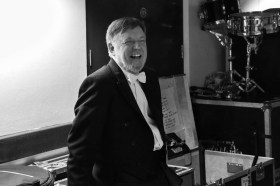The greatest social and political challenge of our time is not global warming, debt in the developing world or terrorism. The most profound problem is emotional and intellectual disconnection from any issue, topic or idea that does not have immediate personal relevance. Karl Marx and Frederick Engels predicted this disengagement when trying to understand how and why exploited workers accepted the dense injustices of the early industrial revolution. They realized that, “life is not determined by consciousness but consciousness by life.” The profound difficulty in making empowered citizens of the world aware of the reasons for environmental damage, the consequences of colonialism or the history of the Middle East is explained through their maxim. If a life is filled with four wheel drives, plasma screen televisions, sun-dried tomatoes and Kate Moss maxi dresses, then a consciousness of pains, pleasures and problems beyond these trivialities is – frankly – impossible to develop.
The last few weeks in the United Kingdom have been filled with concerts, some in an attempt to raise consciousness, some in a mark of commemoration and some – in the case of Glastonbury – to celebrate muddy music and revive 1960s idealism. The strangest concerts, particularly in terms of the press commentary, have been The Concert for Diana and Live Earth. Both demonstrated that popular music is dead as a unifying force between people of diverse ages. The audience for Genesis is distinct from the fans of Metallica. The middle-aged screamers for Duran Duran occupy a different social positioning from the supporters of Nellie Furtado. We hoped that the ipodification of musical tastes through the infinite downloading of itunes would widen pop literacies.
These concerts demonstrate not only the success of the ‘long tail’ and the diversification of sonic literacies, but the fragmentation of music markets. Perhaps the greatest example of this unproductive proliferation was during the Diana concert where Tom Jones performed a cover of the Arctic Monkeys’ ‘I bet you look good on the dancefloor.’ The older, mostly female audience did not recognize the track, wanting to hear ‘It’s not unusual.’ Clearly Tom is ahead of his audience by a wide margin.
However I remain most interested in why Live Earth received one third the televisual audience of the Diana Concert. Why is a consciousness raising event for an issue that is effecting the entire world seen to have less relevance than a slightly morbid event ‘celebrating’ a woman who did some earnest charity work, lived a fairy tale wedding and survived its more depressing aftermath, but has been dead for ten years? Similarly, I have been asking myself not only why the BBC coverage was so poor for Live Earth, but also why all the complaints to both the public broadcaster and the regulator OfCom focused on musicians swearing. Really – think about it – is the most important issue facing public discourse at the moment the fact that Phil Collins swears? While language is important, actions matter much more.
Absent from the complaints about BBC coverage was their extraordinary excising of indigenous peoples from the broadcast. While indigenous performers opened the concert in Sydney, it was not shown on the BBC except through the morning news. Replicating nineteenth century structures where indigenous peoples were reported as a curiosity rather than a source of knowledge, they were shown in a dancing sound bite rather than offering a voice and view on global warming. Even more offensive was the coverage of the Live Earth event in Washington. The presenters ‘filled in’ until Al Gore spoke. What they ‘filled in’ (or over) was the space where indigenous Americans spoke about the importance of the environment. It is not helpful to British citizenship or consciousness to continue to actively forget and ignore colonization and the consequences of the British Empire, British law and British institutions on the rest of the world.
Indeed, there was a significant indigenous story to tell in Live Earth. Al Gore had originally wished the concert to be held in Washington, with the Capitol grounds being a possible location. The Republicans, lead by Senator James Inhofe, blocked this opportunity. Therefore, the organizers based the American performance in the Giants Stadium in New Jersey. However the day before the event, Gore announced that a concert would be held in Washington, at the National Museum of the American Indian. Tom Johnson, the acting director of the Museum and descendant of the Mohawk tribe, confirmed that “there is no more important matter before us than the question of how to live sustainably on the Earth.” Gore expressed his appreciation to the organization in a way that was both historically and politically appropriate. He stated that “The cavalry didn’t come riding to the rescue; the American Indians did.” This was not only a socially generous comment, but an act of tactical historical revisioning. The BBC did not grasp the scale and importance the gesture from the National Museum of the American Indian, or the social and symbolic function of indigenous peoples more generally in understanding environment politics with both rigour and respect.
In the days since the concert, I have continued to be unsettled and unhappy with the BBC coverage, and this concern has nothing to do with Phil Collins swearing. It involved the flattening of politics, the shrinking of history and the disconnection between our daily behaviour – or in Marx’s terms our ‘life’ – and a consciousness of the consequences of our choices on others. Indigenous peoples remain the seers of our future, but they are also a corporeal reminder of our past and the long-term and unpredictable costs of ‘discovery’ and ‘progress.’ Listening to the views of indigenous peoples reminds those of us implicated in the other side of the colonial equation that there are other ways of living, thinking and being.
None of the songs or performers – not Madonna, Crowded House or even Duran Duran – could ease my disquiet. Instead, I have been drawn to one song, played in many versions and renditions but in a near continuous loop through the last week. The track was “Four Strong Winds.” The best known version is probably included on Neil Young’s 1978 album Comes a Time, which he performed not only at Live 8 but in his recent documentary concert Heart of Gold. Featuring the extraordinary harmony of Emmylou Harris, it has become a folk standard.
‘Four Strong Winds’ is a rare song that seems small and insignificant, but is deceptively expansive in its panorama. Although seemingly ‘about’ the life of transient farm workers, it metaphorically captures the fleeting nature of personal relationships and the realization that every transitory moment of happiness is undercut by knowledge that it will not last. This song encapsulates the profound link between our search for happiness and the unrecognized costs of this journey on others.
The history of this extraordinary song is intricate, convoluted and multiple, moving through both space and time. Its origins resonate within the intertwined colonial and musical histories of Canada. It was written by Ian Tyson in 1961. Music was his second career, having learnt how to play guitar while recovering from injuries as a rodeo rider. Meeting his future wife Sylvia in folk clubs in Toronto, they later moved to New York, were assisted by Bob Dylan’s manager Albert Grossman and recorded for Vanguard Records. But it was their second album, titled Four Strong Winds, that ensured their fame by recording this extraordinary song of gentle change and marked consequences. While they recorded many albums, their popular cultural gift was this exceptional song that would continually be reinvented for new times and places. Yet it propels a sonic shard of Canada into the world. Even in 2005, CBC Radio One listeners voted “Four Strong Winds” the greatest Canadian song of all time, and it is still sung on the last night of the Edmonton Folk Music Festival each August.
We learn much about our digitized iTunes age that Ian and Sylvia’s version is not available to download. Many of the fifty covers are available for purchase – from Johnny Cash to John Denver and Bobby Bare – but not the original. As with the BBC coverage of Live Earth, the denial of the original, the indigenous, the first, blocks our careful reflection on time, life and politics.
“Four Strong Winds” is part of a select few songs that resonate in the space between a real and imagined landscape – myth and history – pushing listeners to prize open the gap between self congratulatory nationalism and self aware postcolonialism. The Triffids’ “Wide Open Road,” Icehouse’s “Great Southern Land” and Christine Anu’s “My Island Home” perform a similar function in Australia. The Muttonbirds’ “Dominion Road,” The Front Lawn’s “Andy” and Split Enz’s “Six Months in a Leaky Boat” navigate the ideological expanse between Aotearoa and New Zealand. Live Earth needed more songs to track these spaces of disquiet, contradiction, paradox and confusion. No matter how well Madonna played guitar or Sting trashed Police songs with jazzy excesses, we are left with an uncomfortable discord between expectations and experience, our life and our consciousness.




